Best Biodegradable Soaps of 2025 — Tested, Scored, & Reviewed
Author: Steve Edgerton | Updated: Sep 27, 2025
We may earn a commission when you buy through our links. Learn more.
-
Best Overall: Dr. Bronner’s Organic Liquid Soap
Best for Dishes: Campsuds Biodegradable Concentrated Soap
Best for Hair and Skin: Joshua Tree Body Wash
Best Soap Bar: Dr. Bronner's Pure-Castile Bar Soap
Best Soap Sheets: Sea to Summit Trek & Travel Pocket
Best Biodegradable Wipes: Sea to Summit Wilderness Wipes
-
To determine the best biodegradable soap products, we tested their ability to remove dirt and grime, along with their effects on hands, hair, and skin.
For our primary test, we mixed ½ teaspoon of liquid soap (or one soap sheet/a roughly equivalent quantity of bar soap) into 1 liter of cold water to simulate typical backcountry use. We then assessed each soap’s ability to wash hands of bike grease in a 1-minute time frame.
Cleaning ability, scent, and effects on skin all played into our rankings, as did overall versatility.
Our top picks do everything well, from handwashing to dishes to laundry. We also included a few options that, while lacking versatility, perform best for more specialized backcountry uses.
Editors note
Last revised on Mar 10, 2024, to update specs, remove discontinued soaps, and add some new favorites. We're constantly testing new soaps and will continue to update this review.
Like many stereotypes, the popular image of backpackers as bathing-averse wilderpeople reveling in their own filth has some basis in fact. It takes a certain personality to find joy in an activity involving days or weeks without showering and tossing on the same unwashed clothes every morning.
But not all backpackers are total heathens — for many, biodegradable soap is an easy and highly effective way to add comfort, cleanliness, and general sanitation to what can be a rather crusty undertaking. But using soap in the backcountry demands higher standards: in performance, ingredients, and how backpackers use and dispose of that soap in the wilderness.
These were the standards we looked to when determining the best biodegradable soaps for backpacking and camping. The soaps featured on this list all have both an ingredient list fit for backcountry use, and the performance to be worth bringing along. From all-purpose liquid soap to biodegradable body wipes, you’ll find a top pick for whatever your trip requires.
And if you’re looking to get your entire backcountry bathroom sorted, be sure to also check out our guides to the Best Portable Bidets and Best Backpacking Trowels, as well as our Ultimate Guide to Leaving No Trace in the Backcountry.
Best Overall: DR. BRONNER’S ORGANIC LIQUID SOAP
HANDS & SKIN: 9/10 | DIRT & GRIME: 8/10 | VERSATILITY: 10/10
-
VOLUME: 2 oz (larger volumes also available)
BEST FOR: Dishes, laundry, hands, hair, just about anything
PRICE: $
-
✅ Affordable
✅ Multipurpose
✅ Vegan and cruelty-free
❌ May irritate super sensitive skin
-
Dr. Bronner’s Organic Liquid Soap has garnered a cult following among backpackers and campers. Its plant-based, biodegradable ingredient list, multiple uses, and travel-friendly size make it the perfect do-it-all soap for the backcountry.
Available in both scented and unscented varieties, Dr. Bronner’s castile soaps are strong enough to make your dishes sparkle while remaining gentle enough to use as body wash and shampoo (though folks with sensitive skin may find castile soap a touch too abrasive).
The versatility of this soap is in large part what makes it our favorite biodegradable soap. There are 18 “official” uses for this soap. Beyond using it for dishes and bathing, the soap works well as laundry detergent and lathers nicely as a, shaving cream. Dr. Bronner’s even advertises toothpaste and mouthwash among the soap’s use cases. We tried the peppermint soap as a toothpaste: it was better than you might expect, but far from being pleasant. Our advice? Don’t be a gram weenie and just bring your damn toothpaste.
But questionable applications for oral hygiene aside, this soap will have you covered for everything else. Dr. Bronner’s Liquid Soap is affordable, compact, versatile, and high-performing. It tested well for removing dirt and grime while being nice on skin., making it an easy choice as the best overall biodegradable soap.
Best for Dishes: CAMPSUDS BIODEGRADABLE CONCENTRATED SOAP
HANDS & SKIN: 7/10 | DIRT & GRIME: 9/10 | VERSATILITY: 8/10
-
VOLUME: 2 oz
BEST FOR: Dishes, laundry
PRICE: $
-
✅ Concentrated liquid lasts forever
✅ Hard on grease and dirt
❌ Can be a bit aggressive for some skin/hair
-
Campsuds Biodegradable Concentrated Soap is another standout all-purpose liquid soap for backpacking and camping. The soap solution is super-concentrated, so it only takes a few drops mixed with water to create an effective lather that works on dishes, clothing, skin, and hair.
The concentrated power of Campsuds makes it our favorite soap for washing dishes, as it is easy to up the strength as needed to take on greasy and gritty cookware. Compared to all other liquid soaps we tested, Campsuds was by far the most efficient. A half teaspoon created a sudsy lather capable of deep cleaning a big pile of dishes or grimy hands. Though it works as a body wash and shampoo as well, we found the concentrated solution to be lackluster compared to the other options on our list: it can dry out skin with extended use and doesn't smell as nice.
If you’re looking for a soap primarily for bathing, other soaps will likely serve you better. But for washing dishes and gear, or doing laundry throughout longer treks, Campsuds is our go-to. A 2 oz bottle lasts for an impressively long time and it is strong enough to always get the job done.
Best for Hair and Skin: JOSHUA TREE BODY WASH
HANDS & SKIN: 10/10 | DIRT & GRIME: 7.5/10 | VERSATILITY: 7.5/10
-
VOLUME: 3 oz or 8 oz
BEST USES: Body wash and shampoo
PRICE: $$
-
✅ Added jojoba oil and tea tree oil make it great for skin and hair
❌ 8 oz bottle is overkill for most trips
-
Though many backpackers prefer multipurpose soaps for their versatility, they can leave something to be desired when used to actually wash your body. That is not the case with this organic body wash from Joshua Tree.
This olive oil-based liquid soap is fully biodegradable and features skin-soothing jojoba and tea tree oils. It can be used on dishes and clothing as well. It is not quite as rugged as Dr. Bronner’s or Campsuds, but its effectiveness on grease and grime outperformed our expectations. If clean skin and hair are your top priority but you’d still like a serviceable all-purpose biodegradable soap then Joshua Tree is the way to go.
A bottle of Joshua Tree Body Wash is more expensive than most other soaps featured here, but it is also quadruple the size. The 8 oz bottle is overkill for most backpacking trips. Even the 3 oz bottle is unnecessarily bulky, so we’d recommend transferring 1 or 2 oz into a smaller plastic bottle.
Best Soap Bar: DR. BRONNER’S PURE-CASTILE BAR SOAP
HANDS & SKIN: 10/10 | DIRT & GRIME: 8/10 | VERSATILITY: 6.5/10
-
VOLUME: 5 oz
BEST USES: Body wash and shampoo for travel or camping
PRICE: $
-
✅ Great for sensitive skin
✅ Smells nice
✅ One bar goes a long way
❌ Bar soap is not ideal for backpacking
-
Whether out camping or at home, Dr. Bronner’s Pure Castile Bar Soap is our favorite bar soap — period. Fully biodegradable, with sustainable skin-friendly ingredients and a pleasant scent, this soap nails all of the essentials.
We tend to avoid bar soap for backcountry outings, as it is messy and heavy. But we love Alpine Provisions for travel and camping. It is perfect for things like bike touring, where you’re regularly staying in hostels or hotels, but still would like a forest-friendly biodegradable soap. And, though not ideal, it is still possible to create a “soap cream” for dishes or laundry by grating part of the bar. It still works well with dirt and grime, but it’s a little too messy and involved to be one of our first choices as an all-around soap.
Like all Dr. Bronner’s products, the pure-castile bar soap prioritizes sustainable, ethically produced ingredients. Everything in this soap is certified organic, biodegradable, and cruelty-free. It is also hypoallergenic and free of parabens, sulfates, gluten, nuts, soy, and synthetic fragrances. Scents include lavender, peppermint, almond, citrus, and an unscented option. The bars are very reasonably priced, last a long time, and are a top choice for hands, skin, and hair.
Best Soap Sheets: SEA TO SUMMIT TREK AND TRAVEL POCKET SOAP
HANDS & SKIN: 8.5/10 | DIRT & GRIME: 8.5/10 | VERSATILITY: 7/10
-
VOLUME: 0.5 oz (50 sheets)
BEST USES: Ultralight thru-hikers
PRICE: $
-
✅ Lightweight
✅ Avoids the mess of liquid or bar soap
❌ Limited versatility
-
The lightweight, super packable Sea To Summit Trek & Travel Pocket Soap Sheets are a hassle-free way to stay clean in the backcountry.
The small plastic case holds 50 sheets of biodegradable soap. Dissolve a sheet in a container of water to create a liquid soap lather. Soap sheets are perfect for backpackers in need of an ultralight option. With 50 washes in a half-ounce package, these weigh less than your standard 2 oz travel-size liquid soap, yet will last significantly longer. The hand wash sheets don’t foam up or have much of a scent, but we found that a single sheet, dissolved in 1 liter of cold water, was one of the top performers for removing dirt and grime from hands. They are also less messy: there is no chance of these leaking in your pack.
The primary downside to soap sheets is their limited versatility. Sea to Summit makes specific Pocket sheets for hands, body wash, shampoo, and laundry. They don't have the all-around performance of something like Dr. Bronner’s, but given their almost negligent weight and pack size, it is easy enough to pack multiple options depending on your particular needs.
Best Biodegradable Wipes: SEA TO SUMMIT WILDERNESS WIPES
HANDS & SKIN: 9/10 | DIRT & GRIME: 7.5/10 | VERSATILITY: 5/10
-
VOLUME: 3.7 oz (12 wipes)
BEST USES: Staying fresh without the worry of disposing of soap
PRICE: $
-
✅ Convenient
✅ Made from compostable viscose fiber
❌ Expensive compared to liquid soap
❌ Limited versatility
-
Though not technically a soap, the Sea to Summit Wilderness Wipes are worthy of inclusion on this list.
The wipes come in packages of 8, 12, or 36 to accommodate different trips. You can also pull out however many you need and pack them in a Ziploc bag. Unlike most body wipes, they are also completely compostable. Depending on the climate and local land use restrictions, you could technically bury these in a cathole and they will decompose. But as a rule, we recommend simply always packing them out.
We often prefer wipes to soaps if our goal is to simply stay fresh while backpacking. They are effective and eliminate the hassle of responsibly disposing of soapy water. Compared to liquid soap, these body wipes are expensive (close to $1 per wipe) and not very versatile. They are also not really made for handling heavy duty tasks, like removing bike grease, but work well to manage the type of grime you’ll realistically encounter in the backcountry. The Wilderness Wipes are the ideal biodegradable option if all you need is to freshen up after every few days while on the trail.
OUR TESTING IN PHOTOS
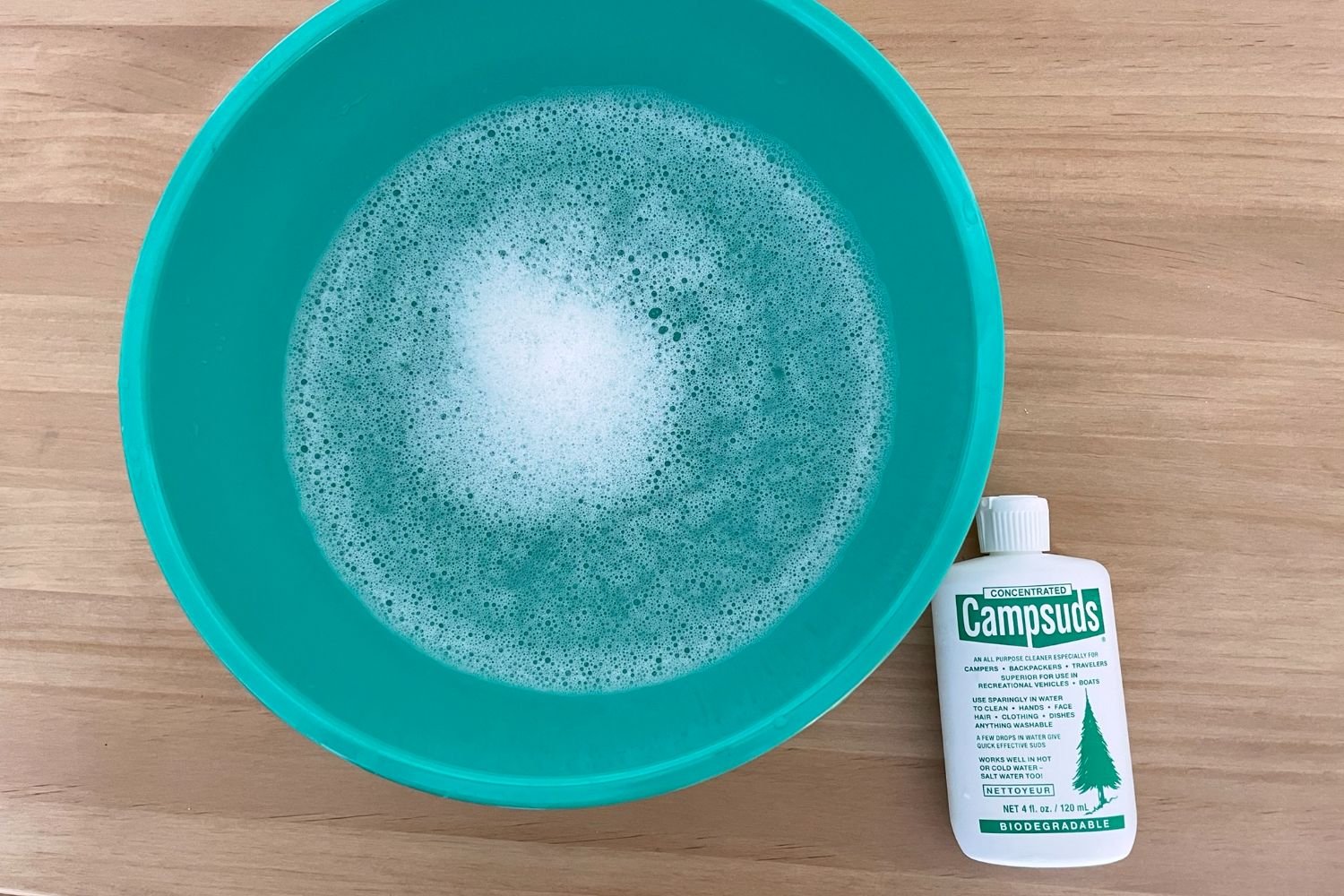
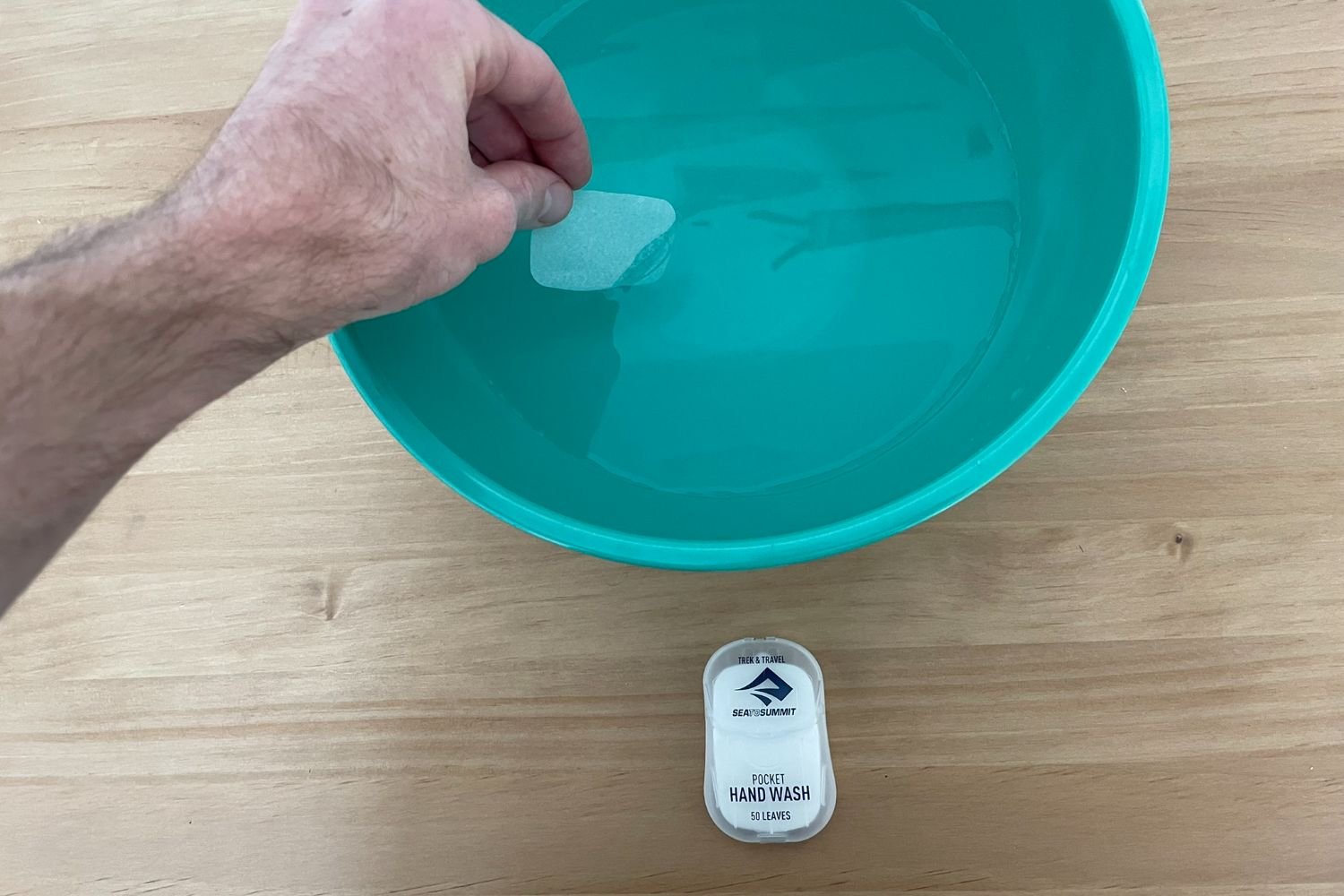
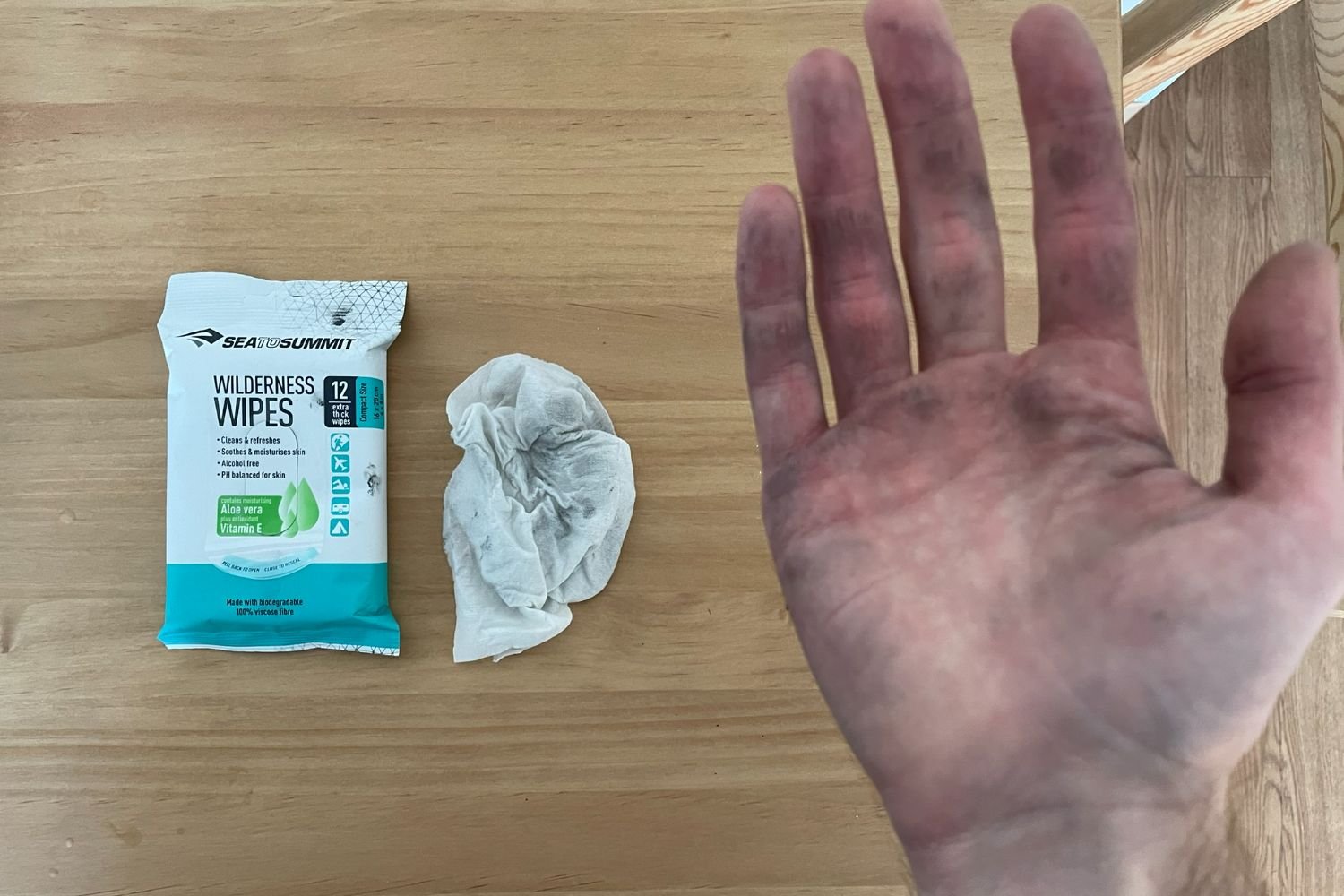
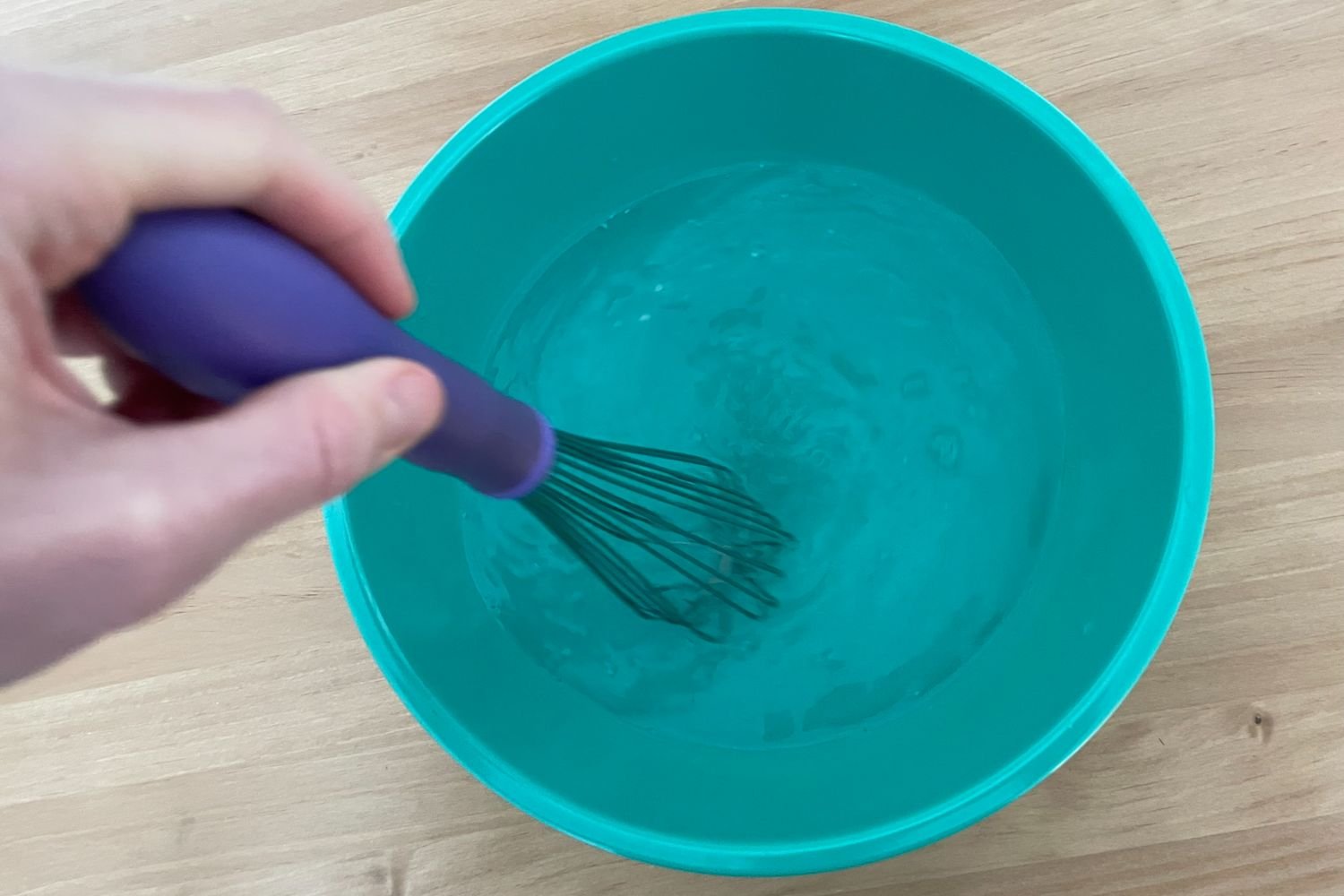
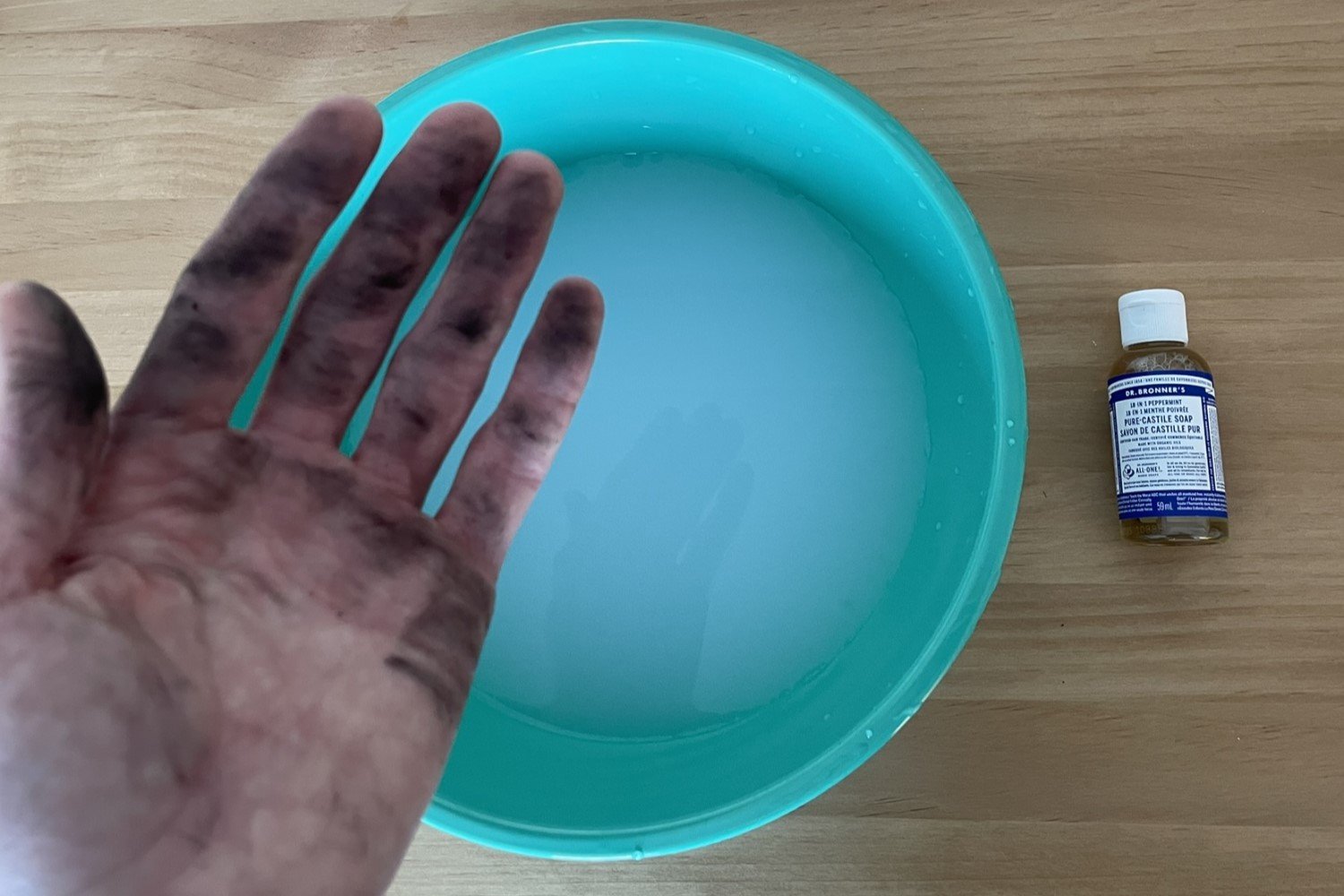
OUR EXPERIENCE WITH BIODEGRABLE SOAPS — WHAT MATTERS MOST
Before deciding on the right biodegradable soap for your backpacking and camping adventures, it is necessary to understand the limitations of using soap in the backcountry.
Despite all of the soaps on our list being fully biodegradable, you cannot simply use them anywhere. These soaps can still have significant environmental impacts, including increasing nitrogen in freshwater sources and harming aquatic creatures.
If you do use soap for bathing, dishes, or anything else, follow the Leave No Trace recommendations and use it 200 feet from water sources, disposing of any soapy water in a cathole at least 6 to 8 inches deep.
If that sounds like too much hassle, then don’t bring soap at all. Body wipes and hand sanitizer are decent alternatives. And, depending on what you eat, a quick scrub with warm water is usually more than sufficient to keep dishes and cookware clean.
But if you do decide to bring along biodegradable soap, here are a few features to pay attention to:
INTENDED USE: Most biodegradable soaps will list their intended use. Some, like Dr. Bronner’s and Campsuds, are intended to be used for just about everything, from cleaning dishes to washing hands to doing the laundry. Others, like Joshua Tree’s Body Wash or Sea to Summit’s Pocket Hand Wash Sheets, are less versatile but gentler, and better for hair and skin. Think about what you will be using biodegradable soap for the most and let that guide you.
SOLID VS LIQUID SOAP: Biodegradable soap is available as a liquid, as bar soap, and as dissolvable sheets. Liquid soap is the most versatile, but heavier and leak-prone. Bar soap has minimal packaging and is good for the skin, but can also be messy and heavier. Soap sheets are ultralight and mess-free, but don’t offer the same versatility as liquid soaps.
WEIGHT AND VOLUME: We find that about 2 oz is the appropriate volume for biodegradable liquid soaps. Soap sheets are significantly lighter while bar soaps can be a fair bit heavier. For liquid soaps that come in larger bottles, like the Joshua Tree Body Wash, we recommend packing a small portion into a more backpacking-friendly, leak-proof vessel.
SCENT: Choosing a scented or unscented soap is mostly a matter of personal preference. Certain scents could perhaps attract wildlife, which would be the only thing to look out for. But as long as you responsibly dispose of soapy water in a cathole far away from camp and store any scented items with your food, it shouldn't be anything to worry about.
You can’t avoid pooping on a long trip in the backcountry, so you’ll want to ensure you have a way to sanitize those hands after you finish your business. Photo of this dunny with a view taken in the beautiful Tonquin Valley.
COMMON QUESTIONS
Can you use biodegradable soap to bathe in rivers or lakes? No, even fully biodegradable soap can pollute freshwater sources, threatening individual aquatic creatures as well as overall ecosystem health. All soapy water should be disposed of by digging a 6 to 8-inch cathole more than 200 feet away from any freshwater source.
Is soap required for backpacking? It is certainly possible to backpack without soap, relying instead on hand sanitizer, body wipes, and thoroughly rinsing dirty dishes or clothing. For long thru-hikes or for anyone whose backcountry cuisine is more involved than dehydrated meals, Clif Bars, and instant coffee, bringing along a food biodegradable soap can be a game-changer.
What makes a soap biodegradable? To be certified biodegradable, a soap must only include ingredients that can be broken down and recycled via natural processes. That means no microplastics or synthetic chemicals.
What is the best biodegradable soap for camping? Our favorite biodegradable soap is Dr. Bronner’s Organic Liquid Soap, thanks to its unmatched versatility and performance, plus its use of sustainable, fair-trade ingredients.
MORE INFORMATION
If you loved this gear review article, then you'll likely love traversing some of our other hiking and backpacking content:
Or check out our entire list of Gear Reviews, Knowledge Base Articles, or Destination Guides for more hiking, backpacking, and outdoors related content.

